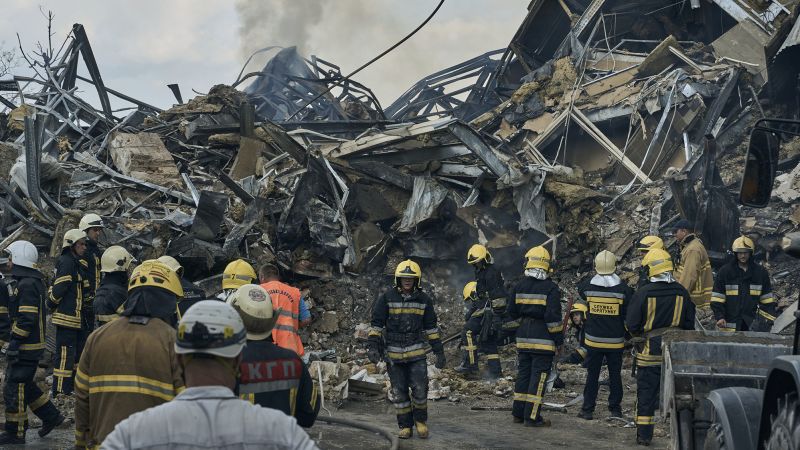Ukraine Struggles to Defend Against Russian Strikes in Odesa
Ukraine is facing a relentless wave of Russian strikes in the southern city of Odesa, with its air defenses unable to effectively counter the missiles used by Moscow. The situation has escalated this week, with Ukraine’s Air Force only managing to destroy five out of 19 Russian cruise missiles fired overnight into Thursday. This lower success rate is attributed to the lack of advanced defense systems in the southern region.
Intense bombardment has left the people of Odesa enduring three nights of continuous strikes. The CNN team on the ground reported hearing explosions and the buzzing sound of drones throughout the port city. The aftermath of the strikes is evident, with one administrative building reduced to ruins.
Officials have urged residents to take cover and seek shelter during the bombardment. However, the air defense systems in the region are unable to intercept Russia’s fast-flying Oniks and Kh-22 missiles. Ukraine’s spokesperson for the Air Force Command emphasized that they are shooting down what they can but would like to do more.
To reinforce the southern regions and protect port cities, Ukraine is in need of advanced defense systems like the Patriot or SAMP-T. In April, Ukraine received two Patriot systems from the United States and Germany, which have proven effective in shooting down missiles targeting Kyiv.
Unlike Ukraine’s older air defenses, the Patriot interceptor missiles have the capability to hit high- and medium-altitude aircraft, cruise missiles, and some ballistic missiles. Equipped with a powerful radar, the system can detect incoming targets at long range, providing a defense against these types of weapons.
However, the large stationary nature of the Patriot battery makes it impossible for the Ukrainian military to quickly redeploy it to different areas. This limitation hampers their ability to respond swiftly to attacks.
The bombardment of Odesa, Mykolaiv, and other settlements in southern Ukraine began on Monday after Ukraine struck the key Crimea bridge. Russia’s Defense Ministry claimed that the strikes were in retaliation for the bridge attack, targeting facilities associated with Ukraine’s seaborne attack drones. However, Ukraine has accused Russia of striking civilian infrastructure associated with grain exports.
The situation has raised concerns over global food security as Russia suspended its participation in an agreement that allowed the export of Ukrainian grain through the Black Sea. Ukraine supplies a significant portion of the world wheat, corn, and barley markets. The attacks on grain infrastructure prompted fierce criticism from Ukraine and its allies, highlighting the impact on the lives of people beyond Ukraine’s borders.
The withdrawal from the grain deal and the ongoing strikes have drawn international condemnation. Samantha Power, the administrator of the U.S. Agency for International Development, expressed deep concern over Putin’s decision, particularly during a time of global food crisis. European Union’s top diplomat Josep Borrell described Russia’s attacks as “barbarian” and warned of a looming food crisis.
The situation in Odesa and the wider conflict between Ukraine and Russia continue to unfold, with the need for advanced defense systems and the impact on global food security at the forefront.
Russia’s Relentless Assault on Global Grain Supply Leaves Ukrainian Air Defenses in Odesa Defenseless
In recent years, Russia has emerged as a dominant force in the global grain market, wielding its agricultural prowess to exert influence and control over nations heavily reliant on imported food supplies. This relentless assault on the global grain supply has not only disrupted international trade dynamics but has also left Ukraine’s air defenses in Odesa defenseless, posing a significant threat to the nation’s security and stability.
Ukraine, known as the “breadbasket of Europe,” has long been a major player in the global grain market. Its fertile soil and favorable climate have allowed the country to produce substantial quantities of wheat, corn, and other grains, making it a crucial supplier to countries around the world. However, Russia’s aggressive agricultural policies have severely impacted Ukraine’s ability to maintain its position as a key grain exporter.
Russia’s strategy to dominate the global grain market has been multifaceted. Firstly, the country has heavily invested in modernizing its agricultural sector, adopting advanced technologies and implementing efficient farming practices. This has resulted in a significant increase in Russia’s grain production, allowing it to flood the market with cheap and abundant supplies.
Furthermore, Russia has strategically used trade embargoes and export restrictions to manipulate global grain prices and create artificial shortages. By limiting its grain exports, Russia has forced importing nations to turn to alternative sources, thereby increasing their dependence on Russian supplies. This tactic has not only undermined Ukraine’s market share but has also weakened its economic stability.
The consequences of Russia’s assault on the global grain supply are particularly evident in Odesa, Ukraine’s major port city and a crucial hub for grain exports. Odesa’s air defenses, essential for safeguarding the nation’s security, have been left defenseless due to the economic strain caused by Russia’s agricultural dominance. The lack of resources and investment in Odesa’s air defense systems has left the city vulnerable to potential threats, jeopardizing Ukraine’s national security.
The defenselessness of Odesa’s air defenses is a matter of grave concern, given the geopolitical tensions between Ukraine and Russia. The ongoing conflict in eastern Ukraine, coupled with Russia’s annexation of Crimea, has heightened the need for robust defense capabilities. However, the economic strain caused by Russia’s assault on the global grain supply has diverted resources away from critical defense infrastructure, leaving Odesa exposed to potential attacks.
To address this pressing issue, Ukraine must take immediate action to strengthen its air defenses in Odesa. This requires increased investment in modernizing and upgrading existing defense systems, as well as enhancing surveillance capabilities to detect and deter potential threats. Additionally, Ukraine should seek international support and cooperation to counter Russia’s aggressive agricultural policies and ensure the stability of the global grain market.
The international community also has a role to play in mitigating the impact of Russia’s assault on the global grain supply. Nations heavily reliant on imported grain should diversify their sources and reduce their dependence on Russian supplies. This would not only safeguard their own food security but also create a more balanced and resilient global grain market.
In conclusion, Russia’s relentless assault on the global grain supply has had far-reaching consequences, leaving Ukraine’s air defenses in Odesa defenseless. This poses a significant threat to Ukraine’s security and stability, particularly in the context of ongoing geopolitical tensions. Urgent action is required to strengthen Odesa’s air defenses and counter Russia’s aggressive agricultural policies. Additionally, international cooperation is crucial to ensure a balanced and secure global grain market. Failure to address these issues could have severe implications for Ukraine and the wider international community.









